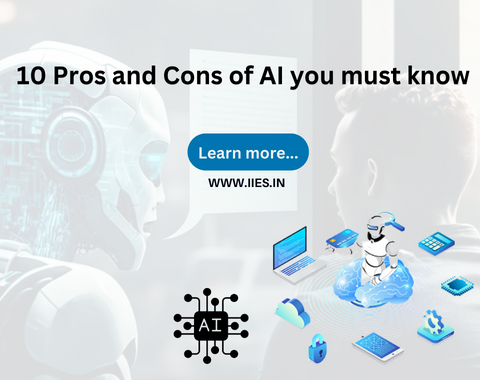Automation and Efficiency
AI excels at automating mundane and repetitive jobs, enhancing efficiency and production across industries. Robots and machines can take over manual labor, freeing up human workers to focus on higher-level tasks that require creativity and critical thinking. For example, in manufacturing, AI-powered machines can assemble products at a faster rate, resulting in increased output and reduced costs.
Enhanced Productivity
With the assistance of AI, professionals can handle a larger volume of work, leading to heightened productivity. AI systems can quickly process and analyze data, provide insights, and even assist in project management. By automating repetitive tasks, employees have more time to devote to more strategic and creative aspects of their work. Content creators, for instance, can use AI to generate ideas, perform data analysis, and improve content quality.
Data Analysis and Pattern Recognition
AI’s ability to process vast amounts of data at high speeds allows for efficient data analysis and pattern recognition. This capability enables AI systems to make accurate predictions, diagnose illnesses, identify market trends, and provide valuable insights for decision-making. In healthcare, AI algorithms can analyze medical records and images to aid in early detection of diseases, improving patient outcomes.
24/7 Availability
AI-powered systems, such as chatbots and virtual assistants, can provide constant availability and support to users. These systems can handle inquiries and provide assistance at any time, enhancing customer satisfaction and reducing response times. Virtual assistants, like Amazon’s Alexa or Apple’s Siri, have become common in households, providing instant answers and performing tasks efficiently.
Personalization and User Experience
Individual preferences and behaviors can be used to personalize experiences. Through analysis of data, AI systems can provide personalized recommendations, optimize user interfaces, and create personalized marketing strategies, leading to improved user experiences and increased customer satisfaction. E-commerce platforms, for example, use AI algorithms to make personalized product recommendations based on users’ browsing and purchase history.
Innovation and Creativity
AI algorithms can simulate human-like creativity, generating innovative solutions in various domains. From art generation to design assistance and even music composition, AI’s ability to think outside the box can amplify innovation and push creative boundaries. In the field of art, AI-powered tools can assist artists in generating unique ideas and automating repetitive tasks, allowing them to focus on their artistic vision.
Improved Customer Service
AI-powered chatbots and virtual assistants have revolutionized customer support. These intelligent systems are available 24/7, providing quick response times to customer inquiries. The use of AI in customer service has greatly improved efficiency and customer satisfaction. However, there are concerns about the impersonal nature of AI interactions. Some customers might prefer human interactions, as they feel more valued and understood. It is important for companies to strike a balance between AI automation and human touch, to ensure a personalized and satisfying customer experience.
Environmental Benefits
AI has the potential to make significant contributions to environmental sustainability. One area where AI can have a positive impact is in optimizing energy usage and resource allocation. Through machine learning algorithms, AI can analyze patterns and make predictions to reduce energy waste and improve overall efficiency. AI can also be applied to agriculture, energy management, and waste reduction. For example, AI can help optimize irrigation systems in agriculture, leading to more efficient water usage. In the energy sector, AI can assist in predicting and managing power demands, resulting in reduced energy consumption. Additionally, AI can aid in waste reduction by identifying ways to recycle and reuse materials. Overall, AI has the potential to contribute to sustainable practices and help address environmental challenges.
Accessibility and Inclusion
One of the key advantages of AI is its ability to assist individuals with disabilities. Through speech recognition technology, AI can help people with speech impairments communicate effectively. Visual recognition technology allows individuals with vision impairments to interact with their environment. AI-powered mobility aids can assist individuals with limited mobility to navigate their surroundings. It is crucial to design AI systems keeping in mind the diverse needs of users. By ensuring accessibility and inclusion in AI development, we can empower individuals with disabilities and provide them with equal opportunities to thrive.
Scientific Advancements
AI has significantly accelerated scientific research and discovery. With its ability to process large amounts of data quickly and efficiently, AI can assist in drug discovery, climate modeling, and space exploration. In drug discovery, AI algorithms can analyze massive datasets and identify potential drug candidates more efficiently than traditional methods. This can lead to the development of new medications and improved treatments. AI is also instrumental in climate modeling, allowing scientists to simulate and predict complex climate patterns. This helps in understanding climate change and its potential impacts, aiding in the development of strategies to mitigate its effects. Furthermore, AI has played a crucial role in space exploration, assisting in tasks such as image analysis and data interpretation. It has enabled us to explore distant celestial bodies and gather invaluable information about our universe. However, there are concerns about the reduction of human intuition in scientific research. While AI can process data at an unprecedented scale, it lacks the human element of creativity and intuition that can lead to breakthroughs. Striking a balance between AI and human expertise is essential to maximize scientific advancements.

